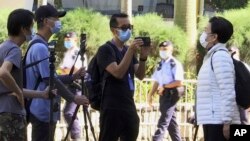Garry Pang Moon-yuen, a pastor, and Chiu Mei-ying, a housewife, were arrested in April for disturbances they made in a court hearing in January when a leader of the group that organized the Hong Kong vigil was sentenced for inciting others to join the prohibited event last year.
Hong Kong is undergoing a political crackdown following widespread protests in 2019 and the imposition of a sweeping national security law in 2020, with many prominent activists in the pro-democracy camp having been arrested or jailed.
Besides the national security law, a growing number of dissidents have also been charged for colonial-era sedition offenses.
Pang and Chiu, instead of being charged with contempt of court, were charged with uttering seditious words. Pang reportedly told the judge "you have lost your conscience" and Chiu reportedly accused the magistrate of not complying with the law and deciding the case arbitrarily.
Magistrate Cheng Lim-chi convicted the pair over the intent to incite others to hate and contempt against the administration of justice, saying their comments were "definitely not a slip of tongue."
Pang was also found guilty on an additional charge of acting with seditious intention for YouTube videos he published between 2020 and this year. In the videos he criticized how judges handled other cases, the court heard.
Sedition is punishable by up to two years in jail for a first offense and three years for a subsequent offense.
For decades, Hong Kong and nearby Macao were the only places in China allowed to commemorate the violent suppression by army troops of student protesters demanding greater democracy in Beijing's Tiananmen Square on June 4, 1989. Hundreds, if not thousands, were killed.
In June, authorities banned the commemoration for a third consecutive year in what was seen as part of a move to snuff out political dissent and a sign that Hong Kong is losing its freedoms as Beijing tightens its grip over the semi-autonomous Chinese city.
On Wednesday, Hong Kong fell three places to 22nd in the world in the latest Rule of Law Index compiled by the World Justice Project.
A Hong Kong government spokesman on Wednesday said the city’s ranking was still better than some Western countries, which he said have "unreasonably" criticized the rule of law in Hong Kong. He said the ranking change in some areas of the index could stem from a lack of understanding about the city.




